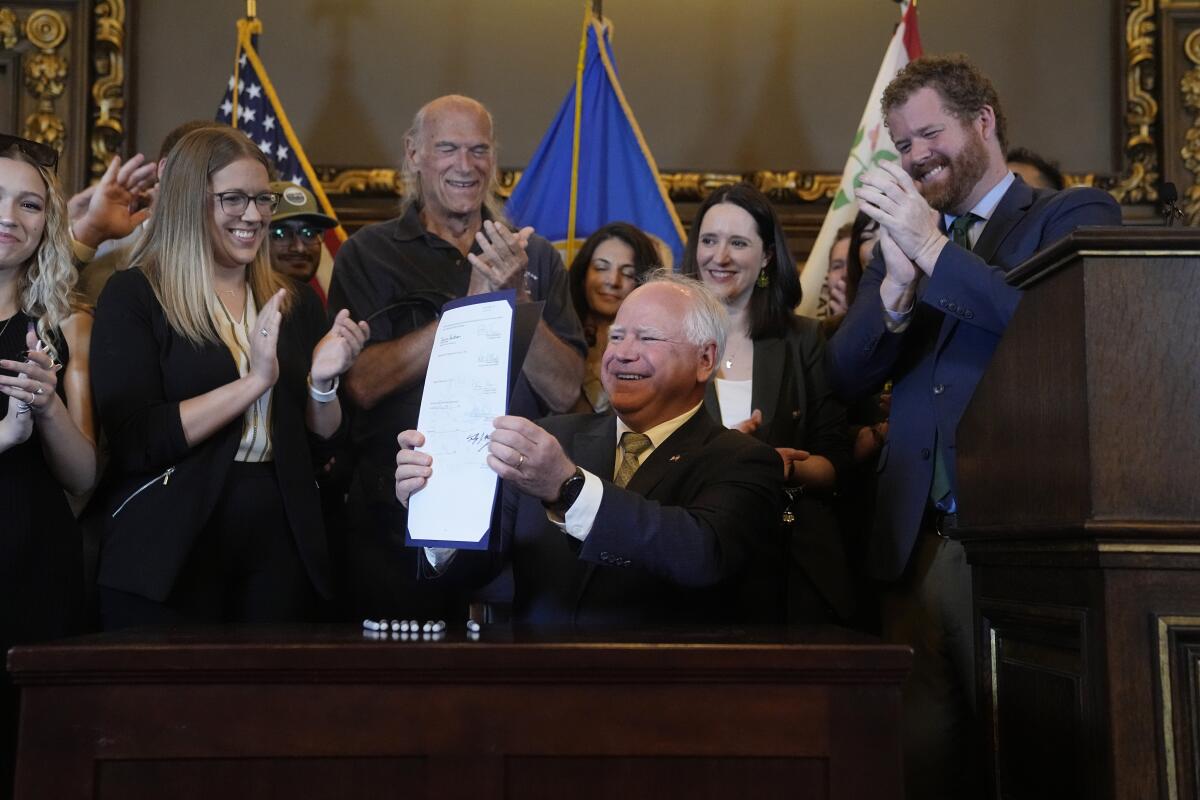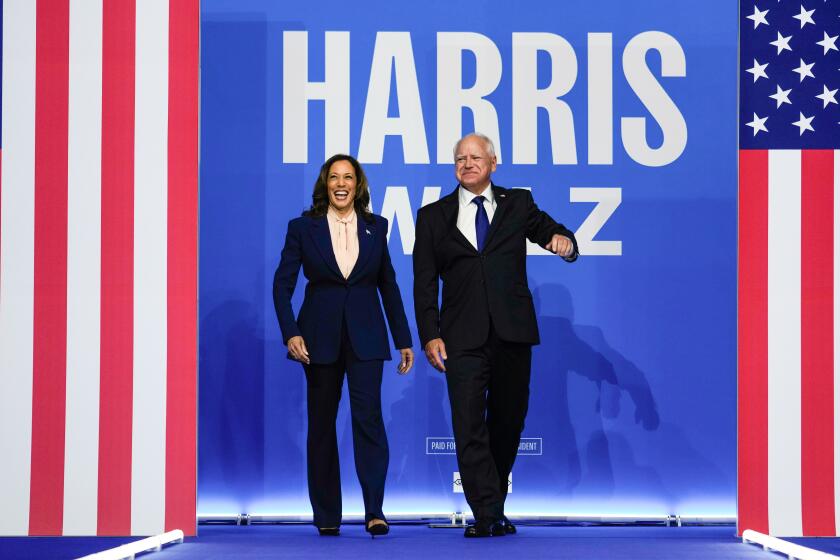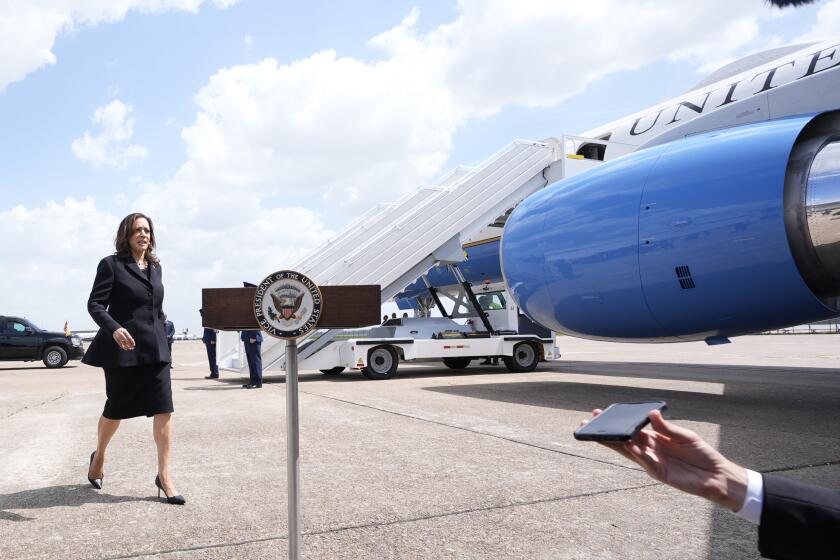‘West Coast wannabe’: Republicans seek to tie Walz to California

- Share via
Tim Walz grew up in a rural Nebraska town about 1,500 miles from the coastal blue cities of Los Angeles and San Francisco.
He governs Minnesota, a Midwestern state even farther away.
But that has not stopped the GOP from rushing to portray Walz — Kamala Harris’ pick for vice president — as an extreme “radical leftist” who seeks to spread California’s “dangerously liberal agenda far and wide.”
“It’s no surprise that San Francisco Liberal Kamala Harris wants West Coast wannabe Tim Walz as her running-mate,” Karoline Leavitt, Trump campaign press secretary, said in a statement as soon as Harris revealed her choice. “Walz has spent his governorship trying to reshape Minnesota in the image of the Golden State.”
Former President Trump went farther, alleging that Walz was more radical than his running mate who grew up in the Bay Area.
Kamala Harris has selected Minnesota Gov. Tim Walz as her running mate. The moderate Democrat demonstrated the ability to work with Republicans when he was in Congress.
“Even worse than Dangerously Liberal and Crooked Kamala Harris – HE’S THAT BAD,” Trump wrote in a fundraising email. “He’ll unleash HELL ON EARTH and open our borders to the worst criminals imaginable. He’ll rubber stamp Kamla’s GREEN NEW SCAM and light trillions of dollars on fire.”
It’s a line of attack that GOP strategists and pundits figure resonates with a Republican base that views California as the ultimate symbol of blue-state left and liberal excess.
The problem, for Republicans, is that Walz, a folksy, straight-talking politician who grew up in Valentine, Neb., has many qualities that veer outside stereotypes of the progressive Democratic urban elite: He is a veteran who served in the Army National Guard for 24 years. He is a former football coach, a hunter and a gun owner.
The GOP narrative of Walz’s radicalism — like some Democratic accounts that emphasize his moderation — fails to capture the complexity of his life and political legacy as a congressman and governor.
Sean Hannity, the conservative Fox News commentator, dubbed Walz the “Bernie Sanders of governors,” promising to devote his afternoon radio show to vetting Walz in detail.
“Tim Walz is a weird radical liberal,” the “MAGA War Room” posted on Tuesday on the social media site X, citing a bill Walz signed last year that required school districts to provide “all menstruating students” with access to menstrual products and an executive order that directed state agencies to support access to “gender-affirming” health care for LGBTQ+ people.
“What could be weirder than signing a bill requiring schools to stock tampons in boys’ bathrooms? Or weirder than signing legislation allowing minors to receive sex change operations?”
Elected governor of Minnesota in 2018, Walz championed many policies associated with California, from clean energy to codifying the right to abortion.
He signed laws that required Minnesota to generate all of its electricity from wind, solar and other carbon-free sources by 2040, guaranteed free school meals to all K-12 students, and allowed immigrants without legal status to get driver’s licenses. Under his leadership, Minnesota was one of the first states to ban so-called conversion therapy for LGBTQ+ minors.
In 2020, Minnesota — like California — received conservative blowback as Walz maintained strict COVID-19 pandemic restrictions. Walz was also accused of being too slow to clamp down on protests that resulted in widespread vandalism and arson in Minneapolis and St. Paul after George Floyd, a Black man, was murdered by a white Minneapolis police officer.
Walz deployed with the Minnesota National Guard three days after Floyd’s death. Nearly 1,500 properties in the Minneapolis-St. Paul metropolitan area experienced property damage at a cost of about $500 million.
In Congress, however, Walz was a centrist who reached across the aisle and appeared almost exactly in the middle of the spectrum of Democrats and Republicans, earning a purple rating from nonpartisan GovTrack.us.
Citing polls that show Harris closing the gap with Trump in nearly every battleground, her campaign plans to court voters in states that lean blue as well as those in the Sun Belt.
“While Walz has governed Minnesota as a progressive, in Congress he represented a Republican-leaning district and was known as a relative moderate,” Christopher J. Devine, an associate professor of political science at the University of Dayton in Ohio, and Kyle C. Kopko, an adjunct professor of political science at Elizabethtown College in Pennsylvania, noted Tuesday in an opinion article in The Times.
Even though Walz has no deep connection with California, Devine said, his liberal record as governor and endorsements from Sen. Bernie Sanders (I-Vt.) and former House Speaker Nancy Pelosi (D-San Francisco) may give Republicans some ammunition to paint him as far to the left.
Yet Walz’s persona — he took Harris’ call Tuesday wearing a camo baseball cap — often appears at odds with ideological expectations.
“He doesn’t really fit the national stereotype of what someone far to the left kind of looks and sounds like,” Devine said. “He’s often called a Midwestern dad. This is not someone from one of the coasts. He’s not someone who has lived his life in a major city, detached from the life that people who live in more rural areas. … His self-presentation is such that voters might feel like what they’re seeing with their eyes doesn’t match what they’re hearing.”
Democrats hope that Walz can appeal to different factions of the party, from rural blue-collar Americans to urban Gen Z progressives. But Republicans argue that Walz’s plain-talking, blue-collar demeanor is a sham that hides his radicalism.
“While Walz pretends to support Americans in the Heartland, when the cameras are off, he believes that rural America is ‘mostly cows and rocks,’” Leavitt said, referring to a statement Walz made as a congressman that conservatives argued was an example of Democrats looking down on the rural heartland.
“You see those maps,” Walz said to an audience in Minneapolis in 2017. “Red and blue and there’s all that red across there. And Democrats go into depression over it. It’s mostly rocks and cows that are in that red area.”
Conservatives promise to keep up the strategy of painting Walz as a Democrat who is radical and out of touch with ordinary Americans.
On Tuesday, GOP politicians, strategists, pundits shared comments Walz made last week to a group of male Harris supporters:
“Don’t ever shy away from our progressive values,” Walz said on a “White Dudes for Harris” call July 29. “One person’s socialism is another person’s neighborliness.”
Sharing a clip of Walz’s comment, Republican Sen. Mike Lee of Utah said: “This is the most radical ticket in American history.”
For his part, Walz is quick to dismiss GOP bluster about socialism.
“I have to tell you, they scream ‘socialism,’” Walz said last month on MSNBC. “We just build roads — and we build schools and we build prosperity into this. Their whole plan is to go backwards.”
More to Read
Get the L.A. Times Politics newsletter
Deeply reported insights into legislation, politics and policy from Sacramento, Washington and beyond. In your inbox twice per week.
You may occasionally receive promotional content from the Los Angeles Times.













